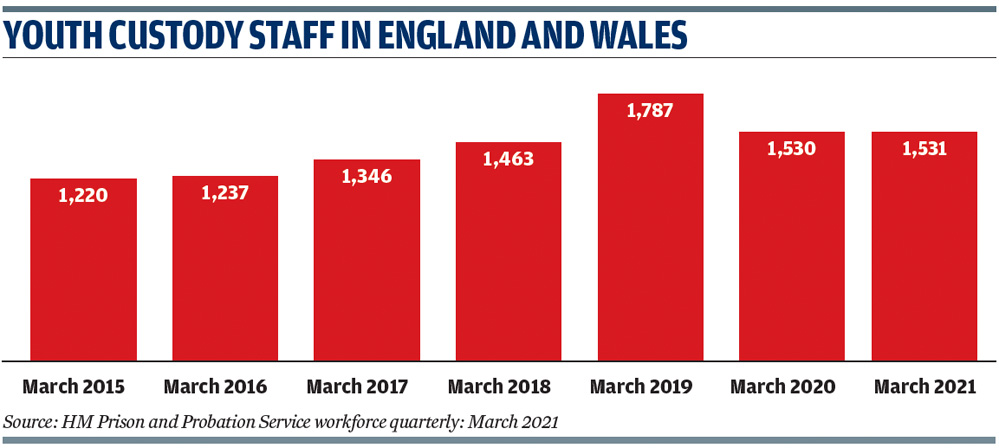
The Youth Justice Institute offers short online courses including two free courses and four Effective Practice Awards, accredited by Skills for Justice Awards. Key youth justice qualifications include the Youth Justice Effective Practice Certificate (YJEPC), accredited by Skills for Justice Awards and endorsed by the YJB.
The Foundation Degree in Youth Justice is at the heart of the Youth Justice Professional Framework and based on the key competencies required for work in the youth justice system, identified in the Youth Justice Skills Matrix. It is delivered to both community and secure establishments and consists of four modules taken over two years and two months, or 18 months for those who have completed the YJEPC.
A Level 5 Youth Justice Practitioner apprenticeship was approved in July 2021, but has yet to launch.
Secure estate
The Youth Custody Service (YCS) is a specialist service within HM Prison and Probation Service. Youth justice workers work with 12- to 18-year-olds in specialist young offender institutions (YOIs) or in Medway Secure Training Centre (STC).
Youth justice workers start with 12 weeks’ Prison Officer Entry Level Training, specialising in working with children and young people in custody. They receive a NVQ Level 3 qualification. All Band 3 youth justice workers are expected to complete the first two modules of the youth justice foundation degree. They are then expected to complete the degree and progress to the role of Band 4 youth justice worker specialist. All YCS officers are expected to be specialists by 2023. Some 201 have already achieved the degree-level qualification and 314 others are in training.
The second and final cohort of a pilot fast-track 15-month training programme began in September 2020. The salaried programme includes 13 months of training and two months of accreditation.
Leadership development programme Unlocked Graduates is now in a number of YOIs including Feltham, Cookham Wood and Werrington. In 2021, the programme took on more than 120 graduates to be placed as prison officers across nearly 30 prisons. To be eligible for the fully-funded programme, which includes work towards a Masters degree, graduates must have a 2:1 or above. They receive a salary of up to £30,000 depending on location. Applications open for the next cohort in mid-September 2021.
Secure schools aim to provide educational rehabilitation for children aged 12 to 17 remanded or sentenced to youth detention. The first school, run by charity Oasis, will open in late 2022. Oasis plans to recruit about 150 staff.

Community
YOTs comprise practitioners from a wide range of backgrounds with different training needs. The YJB’s skills audit tool is designed to help practitioners identify potential gaps in their knowledge and gain access to targeted training.
Some YOTs take on unqualified workers who work their way up. A qualification in social work is desirable but not essential. Once employed by a YOT, they undertake youth justice specific in-service training and may get the opportunity to do YJEPC or a youth justice degree.
The Association of YOT Managers (AYM) runs the Aspiring Future Leaders course, in partnership with Solace Enterprises. This is aimed at operational managers within YOTs, who want to develop their leadership skills and apply for heads of service roles. The course is set at Institute of Leadership and Management (ILM) Level 5 and can include work towards a Certificate in Leadership and Management offered separately by local government leadership body Solace.
The AYM also offers an accredited ILM Level 7 Certificate in Leadership and Management for YOT heads of service, also in conjunction with Solace. The next cohort will start in autumn/winter 2021.
The Youth Justice Sector Led Improvement Partnership (YJSIP) is funded by the YJB, administered by the AYM, and delivered by senior leaders in youth justice. The YJSIP offers training for managers interested in undertaking peer reviews of YOTs and peer review team leader training. It also offers operational manager training, coaching and mentoring for YOT managers and supervisors.
Probation
A revamped Probation Service was launched in June 2021. The service is looking to expand, with a record 1,007 recruits in 2020 and plans to recruit a further 1,500 by March 2022. Refreshed national standards ensure staff meet face-to-face with all the offenders they supervise at least once a month with an expectation staff will visit offenders’ homes. There are also plans to increase diversity with targeted recruitment campaigns, new regional race ambassadors and inclusivity training.
The workforce consists of probation officers and probation service officers (PSOs). PSOs only supervise low-risk offenders. Probation officers can work in YOTs on secondment.
To train as a probation officer, applicants need a recognised Level 5 qualification or above in any subject. They also need relevant paid or voluntary experience of working with people in crisis and those who display challenging behaviour. Aspiring probation officers start as PSOs and work their way through the Professional Qualification in Probation (PQiP) programme, gaining a Level 5 vocational qualification diploma in probation practice and an honours degree.
The PQiP PSO Progression Programme, an accelerated pathway from PSO to probation officer, launched this year. PSOs taking this path do not need a Level 5 qualification and can study part-time or full-time.

